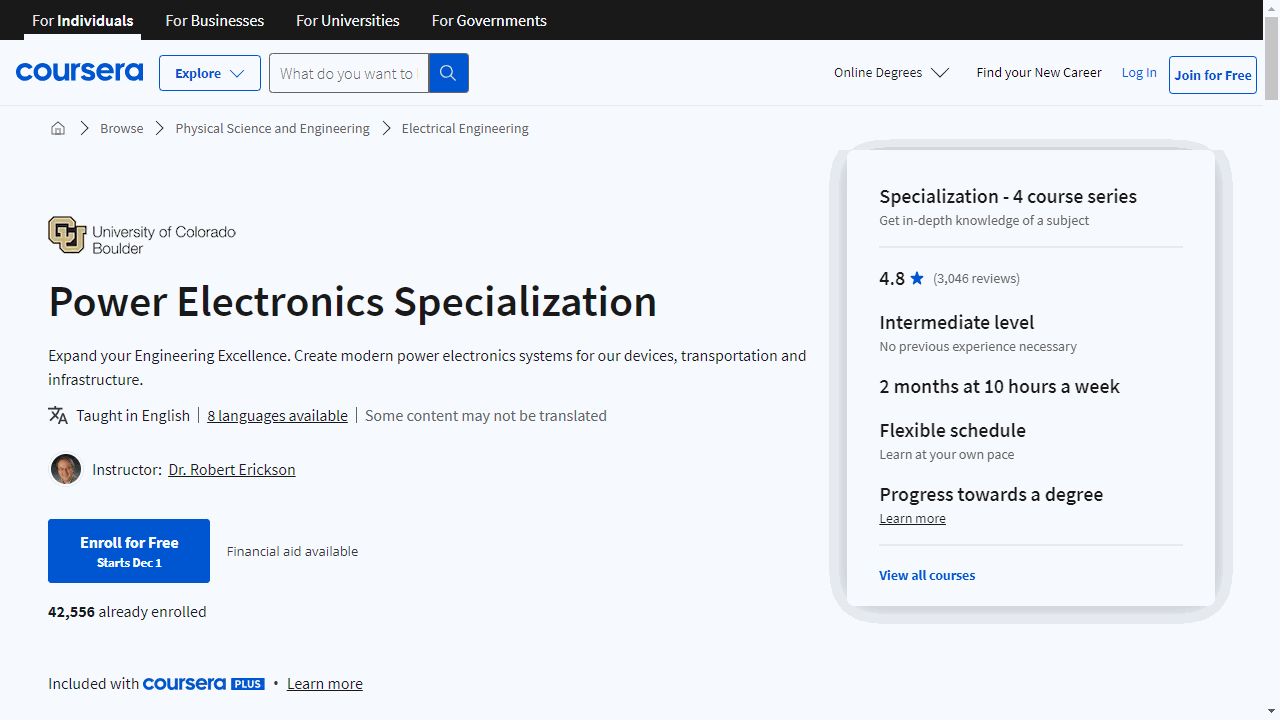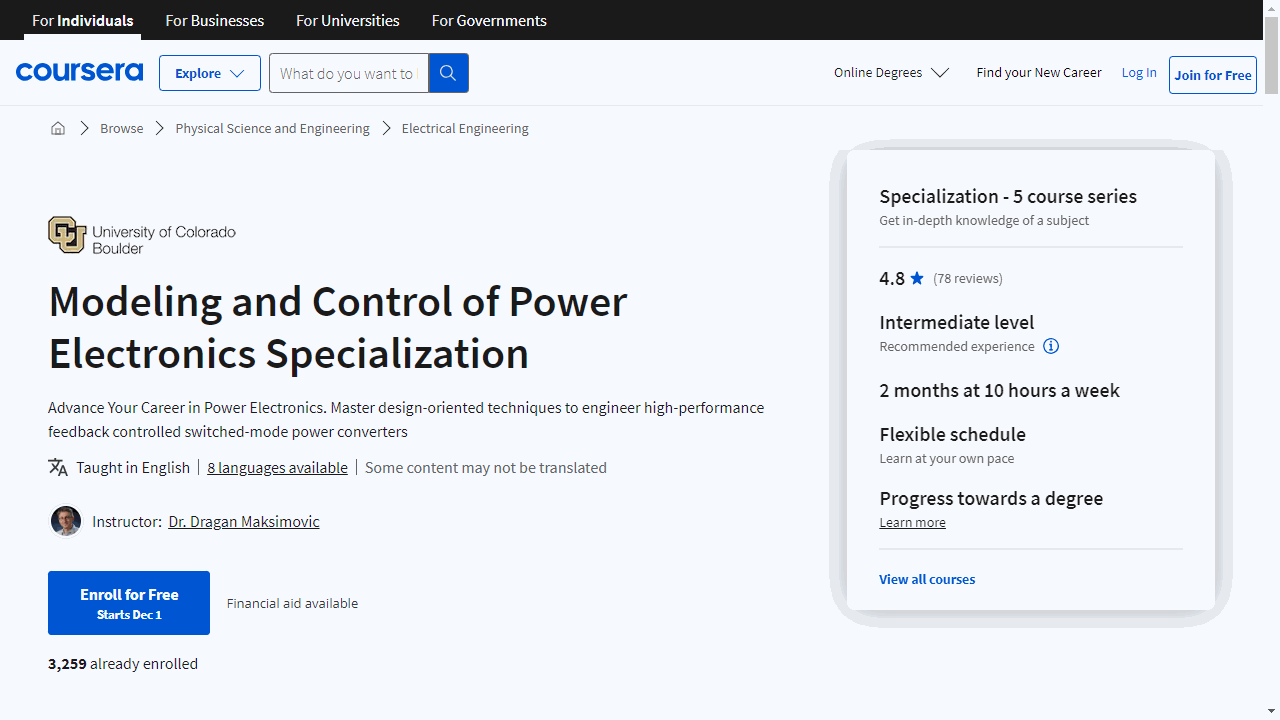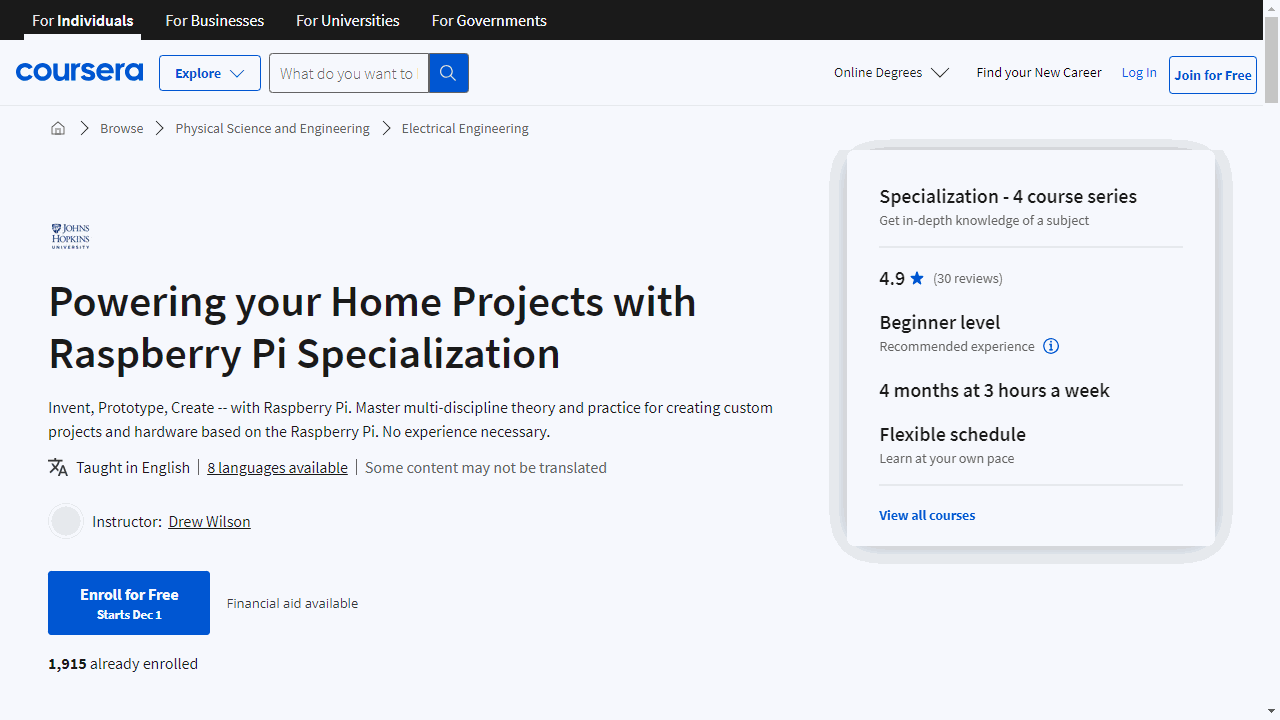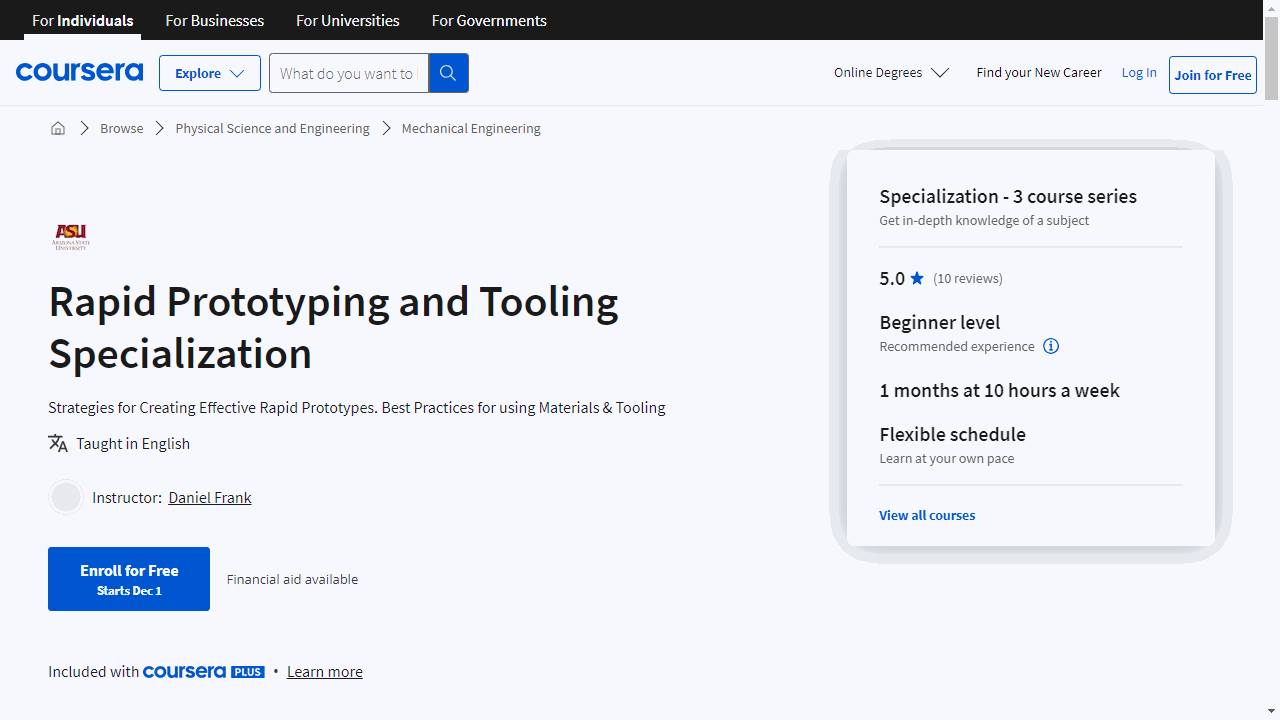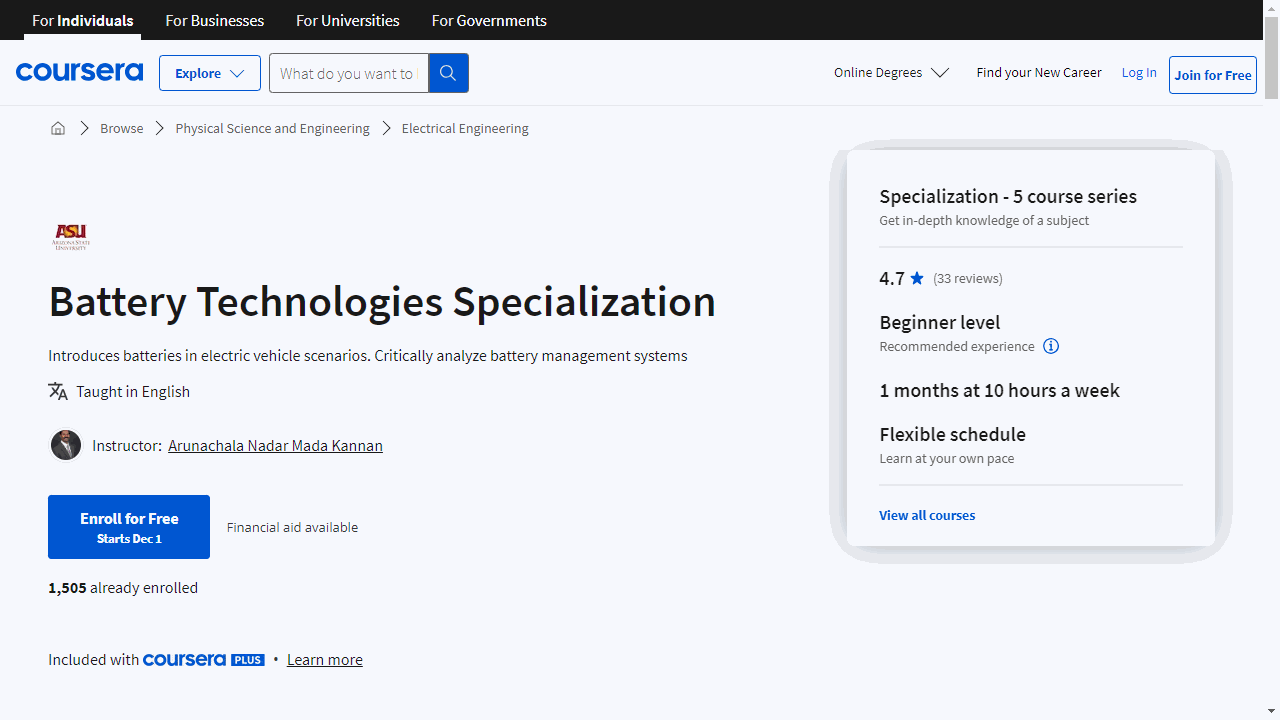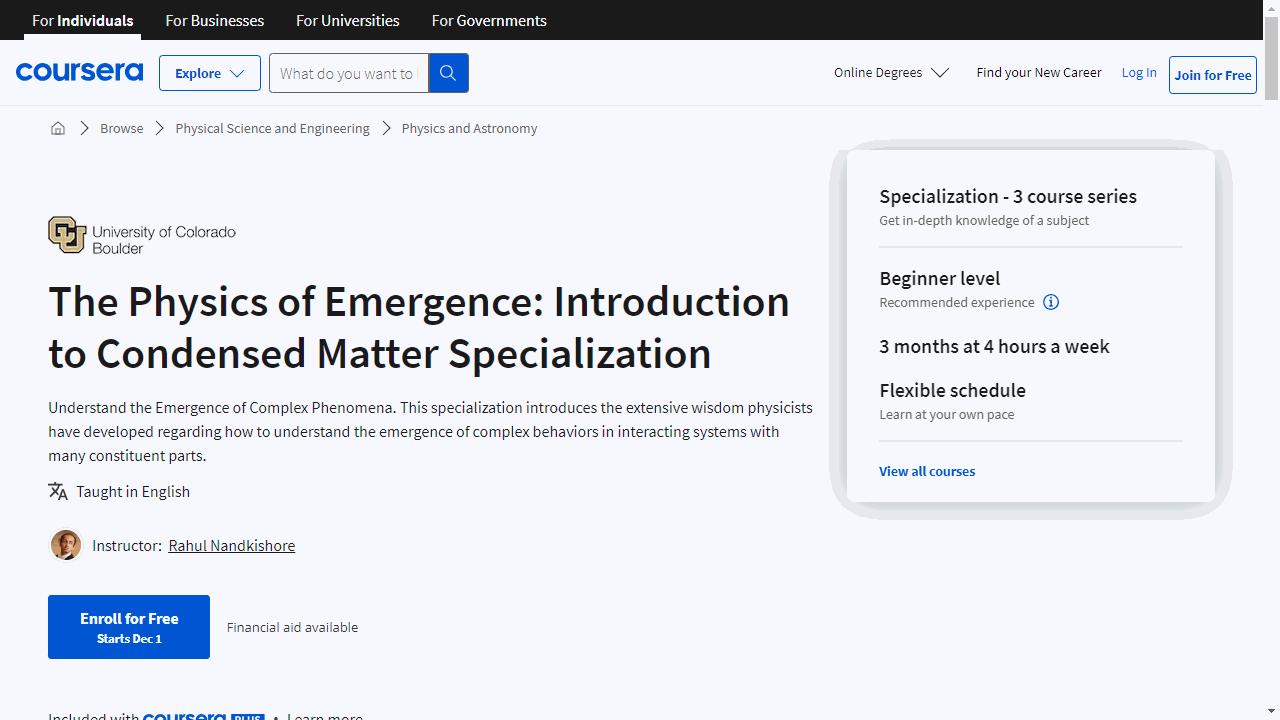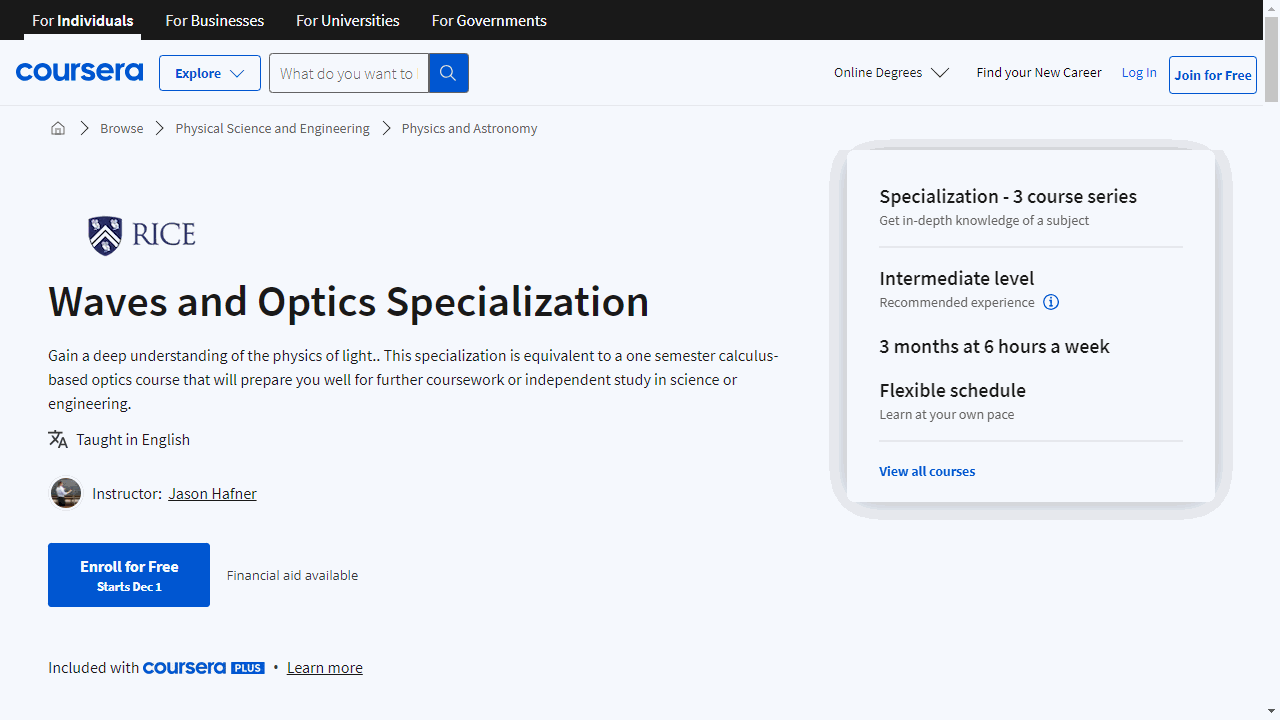Electronics is the foundation of our modern world, powering everything from our smartphones to our cars.
Understanding electronics allows you to build, repair, and innovate with technology.
Whether you’re a hobbyist tinkering with circuits or an aspiring engineer, learning about electronics opens up a world of exciting possibilities.
Finding the right electronics course on Coursera can be challenging with so many options available.
You want a program that’s engaging, taught by experts, and provides hands-on experience to truly grasp the concepts.
For the best electronics course overall on Coursera, we recommend "Power Electronics Specialization" by the University of Colorado Boulder.
This specialization offers a comprehensive journey through the fundamentals of power electronics, covering topics like converter circuits, control techniques, and magnetics.
Taught by experienced faculty, this program is packed with practical examples and projects, making it ideal for anyone looking to gain a strong foundation in power electronics.
While this specialization is our top pick, there are many other excellent options on Coursera that delve into specific areas of electronics.
Keep reading for more recommendations, including courses on semiconductor devices, packaging, and even the physics behind these technologies.
Power Electronics Specialization
Starting with “Introduction to Power Electronics,” you’ll grasp the essentials of switched-mode converter circuits.
This foundational course sets you up to confidently analyze and optimize power systems for efficiency—a critical skill in both consumer electronics and larger-scale electric vehicles.
Progressing to “Converter Circuits,” you delve deeper into the technicalities of power semiconductors and their role in modern inverters and converters.
You’ll get hands-on experience with circuit topologies, including those that incorporate transformer isolation—a key component in ensuring safe power conversion.
In “Converter Control,” the focus shifts to the precision of power management.
You’ll learn to design feedback systems that regulate and refine the performance of switching regulators.
This course is about fine-tuning power systems to respond swiftly and maintain stability under varying conditions.
Lastly, “Magnetics for Power Electronic Converters” rounds out your expertise by demystifying the role of magnetic components in power conversion.
You’ll tackle the design and optimization of inductors and transformers, ensuring that your power systems are not only functional but finely tuned for peak performance.
Modeling and Control of Power Electronics Specialization
This series of courses from CU Boulder is designed to equip you with hands-on skills for designing and controlling advanced power electronics systems.
Start with “Averaged-Switch Modeling and Simulation,” where you’ll delve into the design-oriented modeling of power converters.
You’ll learn to apply Middlebrook’s feedback theorem and use simulation tools to create high-performance control loops.
Move on to “Techniques of Design-Oriented Analysis,” which teaches you quick and effective methods to analyze switching power converters.
The Extra Element Theorem and N-Extra Element Theorem simplify complex circuit analysis, enabling you to design efficient converters with ease.
In “Input Filter Design,” tackle electromagnetic interference (EMI) and compatibility (EMC) head-on.
You’ll design input filters that meet stringent requirements and ensure the stability of your power converters, using computer-aided tools for validation.
“Current-Mode Control” introduces you to the preferred control techniques for dc-dc converters.
Learn about peak and average current-mode controls, and how to incorporate overcurrent protection into your designs.
Finally, “Modeling and Control of Single-Phase Rectifiers and Inverters” focuses on grid-tied power electronics.
You’ll design low-harmonic rectifiers and inverters that efficiently interface DC power sources with the AC grid.
Powering your Home Projects with Raspberry Pi Specialization
Start with “Beginning Custom Projects with Raspberry Pi” to lay your foundation.
You’ll learn to set up and network a Raspberry Pi 4, control sensors and motors, and manage your project via a web interface.
This course is beginner-friendly, offering extra guidance in Python, Linux, and electronics to ensure you’re well-equipped to bring your ideas to life.
Move on to “Communications and High-Speed Signals with Raspberry Pi” to understand the communication between your project’s components.
You’ll get to grips with signal protocols and the physics of high-frequency signals, simplifying complex concepts into actionable knowledge.
The course culminates in five practical design rules to ensure your high-speed signals work seamlessly.
In “Using Sensors With Your Raspberry Pi,” you’ll focus on integrating sensors effectively.
Calibration, accuracy, and noise reduction are demystified, and you’ll apply these concepts using Python for data processing.
This course empowers you to tailor sensor integration to your specific project needs.
Lastly, “Designing Hardware for Raspberry Pi Projects” teaches you to design and build your own electronics hardware.
You’ll navigate circuit simulation, schematic entry, PCB layout, and 3D CAD modeling using open-source tools.
This course bridges electrical and mechanical design, enabling you to create cohesive and custom hardware solutions.
Semiconductor Devices Specialization
This series, part of CU Boulder’s Master of Science in Electrical Engineering degree, offers a deep dive into semiconductor fundamentals and their applications.
Starting with “Semiconductor Physics,” you’ll unlock the mysteries of quantum theory as it applies to solids.
This course isn’t just about theory; it’s about connecting those principles to the behavior of carriers in semiconductors, which is crucial for understanding electronic devices.
Then, “Diode - pn Junction and Metal Semiconductor Contact” takes you into the core of diode functionality.
You’ll dissect the pn junction, the cornerstone of diode operation, and explore the nuances of metal-semiconductor contacts.
This course is hands-on, equipping you with the skills to analyze current, capacitance, and breakdown behaviors.
Finally, “Transistor - Field Effect Transistor and Bipolar Junction Transistor” focuses on the backbone of modern electronics: transistors.
You’ll get to grips with MOSFETs and BJTs, learning about their operational characteristics and how they amplify current.
This course is essential for anyone looking to understand or work with electronic circuitry.
Each course is stacked with knowledge, and you have the option to earn academic credit.
Semiconductor Packaging Specialization
This specialization is a deep dive into the essentials of microelectronics and nanoelectronics, tailored for you if you’re aiming to master the field.
The journey begins with “Introduction to Semiconductor Packaging,” where you’ll unravel the complexities of integrated circuits.
You’ll learn about transistor actions and the significance of packaging in connecting and protecting these tiny tech marvels.
The course demystifies Moore’s Law and its impact on the industry, setting a solid foundation for your understanding.
Moving on to “Semiconductor Packaging Manufacturing,” you’ll get an insider’s view of the manufacturing process.
This course equips you with practical skills in Process Control Systems and quality testing, ensuring you can maintain high standards in the production of semiconductor packages.
You’ll become adept at using control charts, a crucial tool for monitoring and refining manufacturing processes.
Lastly, “Advanced Semiconductor Packaging” propels you into the future of the industry.
Here, you’ll explore groundbreaking packaging technologies for incredibly small feature sizes.
The course emphasizes the role of packaging in enhancing product performance through innovative methods like heterogeneous integration.
Each course is rich with technical details, yet presented in a way that’s accessible and engaging.
You’ll gain valuable skills such as thermal management and advanced packaging design, making you well-equipped for a career in the semiconductor industry.
Semiconductor Characterization Specialization
Start with “Fundamentals of Semiconductor Characterization” to solidify your grasp on semiconductor basics, focusing on CMOS technology.
You’ll revisit energy band diagrams and the interplay between conductivity, carrier concentration, and mobility.
This course ensures you can differentiate between direct and indirect bandgap semiconductors, a fundamental concept in electronics.
In “Electrical Characterization: Diodes,” you’ll tackle resistivity and sheet resistance, learning to accurately measure these properties in semiconductors and metals.
The course demystifies the transfer length method for contact resistance and guides you through current-voltage measurements to derive essential diode parameters.
“Electrical Characterization: MOSFETs” introduces you to the critical role of MOSFET transistor switches in electronic devices.
You’ll learn to extract parameters from MOS capacitors and MOSFETs, including the threshold voltage, using real-world data.
This course equips you with the analytical skills to assess and optimize transistor performance.
“Electron and Ion Beam Characterization” offers a microscopic view of semiconductor materials and devices.
You’ll explore the interactions of electron and ion beams with materials, gaining insights into the composition and structure at a sub-nanometer scale.
The course includes practical analysis of surface roughness, enhancing your precision in material assessment.
Lastly, “Optical and X-Ray Characterization” teaches you to employ light and X-rays for non-destructive analysis of semiconductor films.
You’ll learn to measure film thickness and quality, and understand the absorption and emission of light in semiconductors.
This course highlights the balance between the capabilities and limitations of these advanced characterization techniques.
Rapid Prototyping and Tooling Specialization
This specialization is tailored for you if you’re keen to master the art of bringing electronic designs from concept to reality.
Dive into “Using Rapid Prototyping in the Engineering Design Process” to grasp the essentials of the design process and rapid prototyping’s role within it.
You’ll learn to navigate from problem-solving to creating quick prototypes, and gain skills in CAD to visualize and design your ideas effectively.
In “Adding Electronics to Rapid Prototypes,” you’ll tackle the fundamentals of circuits, using breadboards, and reading multimeters.
This course empowers you to integrate electronic components like motors and microcontrollers into your prototypes, adding functionality and complexity to your designs.
Lastly, “Rapid Prototyping Materials and Tooling” offers a deep dive into selecting the right materials for your projects.
You’ll compare the properties of various materials and learn about manufacturing tools such as 3D printers and laser cutters, ensuring you make informed decisions for your prototypes.
Each course is enriched with practical examples from robotics, providing you with a real-world context.
Battery Technologies Specialization
If you’re particularly interested in electric vehicles and smart energy systems, this specialization is for you.
Dive into “Primary and Secondary Batteries” to grasp the essentials of battery operation.
You’ll learn to enhance energy and power density for automotive applications, making you a key player in advancing battery technology.
For a specialized focus, “Zn and Ni Based Batteries” offers a deep dive into the materials and chemistry of Zinc and Nickel batteries.
You’ll master the art of selecting and sizing batteries for various devices, equipping you with the precision of a skilled technician.
“Lithium Based Batteries” zeroes in on the most sought-after battery type in the market.
You’ll uncover the intricacies of Lithium battery materials and processes, positioning you at the forefront of this critical industry segment.
In “Battery Comparison, Manufacturing, and Packaging,” you’ll navigate the complexities of battery management systems.
Understanding electrical and thermal protections, cell balancing, and health estimation will make you indispensable in the battery manufacturing field.
Finally, “Batteries and Electric Vehicles” connects your newfound knowledge to the booming EV sector.
You’ll explore battery performance, charging infrastructure, and regulatory landscapes, preparing you to lead in the zero-emission vehicle revolution.
The Physics of Emergence: Introduction to Condensed Matter Specialization
Start with “Phases of Matter: Solid, Liquid, Gas and Beyond,” where you’ll delve into the emergence of complex behaviors from simple rules.
You’ll learn to define phases of matter, understand the role of symmetry, and grasp how energy and entropy interact to cause phase transitions.
This course lays the groundwork for understanding the materials that make up electronic components.
Move on to “Universal Theories” to uncover the principles that govern a wide array of systems.
Here, you’ll get acquainted with the renormalization group and band theory, concepts crucial for explaining why materials behave as conductors or insulators.
This knowledge is directly applicable to understanding the electronic properties of materials.
Lastly, “Modern Topics in Condensed Matter Physics” introduces you to the forefront of physics with a focus on superconductivity and other quantum phenomena.
You’ll explore cutting-edge concepts like topology in physics, which are essential for the development of new electronic materials and technologies.
This Specialization doesn’t require advanced physics or math, just some algebra and a basic understanding of atoms and energy.
Waves and Optics Specialization
Start with “Oscillators and Waves,” where you’ll tackle the Wave Equation and learn about wave motion—a fundamental concept in electronics.
This course equips you with problem-solving techniques using algebra and calculus, setting a strong foundation for tackling complex electronic phenomena.
Move on to “Light and Materials,” which demystifies how light interacts with different substances.
You’ll delve into Electromagnetic Plane Waves and Polarization, gaining practical skills in analyzing how light behaves—a crucial aspect of designing and understanding electronic devices.
The final course, “Geometrical and Physical Optics,” offers a deep dive into lenses and optical systems.
By mastering the Lens Equation and exploring Image Formation, you’ll be well-prepared to handle the optical components often encountered in advanced electronics.
Each course is structured with video lectures, quizzes, and homework problems, culminating in an exam to solidify your understanding.
Modeled after Rice University’s rigorous curriculum, this specialization ensures you’re getting a high-quality education that’s directly applicable to the field of electronics.
